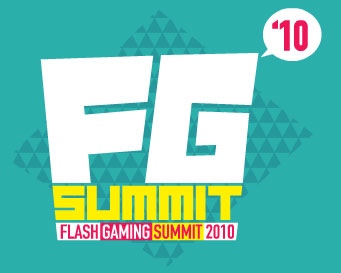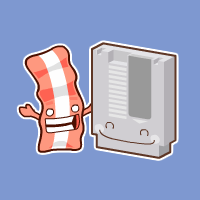 If you didn’t have a chance to watch the live streams yesterday, all the presentations have been archived and are now available for you to watch at your leisure. Mochi posted a list here. The presentations are broken down chronologically by room.
If you didn’t have a chance to watch the live streams yesterday, all the presentations have been archived and are now available for you to watch at your leisure. Mochi posted a list here. The presentations are broken down chronologically by room.
The Robertson Room focused mainly on the business side, with presentations about how to market and monetize games. The Fisher Room was more development oriented, hosting talks from Adam Saltsman on Canabalt, Nitrome on their growth from a 2 man operation to what they are today and also from Sean Cooper who shared some of his techniques for handling tons of calculations per second without bringing Flash to its knees. I sat in on an even number from each because I walk the line between game developer and game producer; both topics are of interest to me.
I don’t want to summarize because you really should just go check out whichever you think would be relevant to you, though I will say that I particularly enjoyed the panel entitled Everything About Sponsorship & Licensing from the business side and Sean Cooper’s talk from the developer’s perspective. Sadly I didn’t get up early enough to catch Adam Saltsman but you can be sure I’ll be checking out that archive before long.
There were quite a few great quotes I could pull from the Summit but I particularly enjoyed these 2, which came almost back to back from the panel on Monetizing Your Game Outside of Sponsorship. The first was from William Stallwood of Cipher Prime. When asked (and I’m paraphrasing the question because it was worded poorly) what he hoped would be the future of the Flash game industry, he responded
[51:05] I kinda want to see Flash games not be called Flash games anymore….when somebody says Flash games I want to call it a game…If I had my personal way every person who called a Flash game a ‘Flash Game’ I’d slap them in the face and they’d call it a game for the rest of their life and we could all not have to worry about disguising our games…
Though also poorly worded (it’s ok, these guys were put on the spot) his message was clear: Flash games unfortunately carry a negative stigma. This is probably due to the fact that getting into making Flash games has such a low startup cost. Flash is an affordable tool readily available to the masses. Couple that with sites like Newgrounds, Kongregate and other automated game portals and the average internet patron will find themselves wading through 20 shitty Flash games before they find 1 good one. It’s simple numbers. It’s easy to get into so everyone does which floods the market with sub-par games. Yes bad console games exist, but if you look through your collection you’ll find a better ratio than 20:1. Flash is an easy entry point into programming, game portals are available for instant feedback and as a result a community of basement game developers was born…many of whom will go on to create amazing games on their own or find jobs in the industry (me, for one). This is a great thing from the perspective of game developers and for the game development community as a whole. With new programmers being born every day, the community grows, Adobe starts listening and we can as a community begin to shape the tools we use, help Actionscript evolve into what we want it to do and events like the Flash Gaming Summit can take place. And with attention on the Flash community, sponsorship and ad dollars become viable options for the very people who built the community in the first place.
The downside is that Joe Internet doesn’t know the difference between the dabblers, the new comers, the student drivers and the seasoned and dedicated Flash game developers. They all get lumped under one heading: Flash Games. The community doesn’t deserve to bear the burden of its low startup cost, especially when it’s that startup cost that fostered the growth of the community in the first place. Stallwood’s comment speaks to this point. It would be great if we could get to where the platform is inconsequential. Who cares if it’s a Flash game? A game is a game. Whether tacking Flash to the beginning of a game carries a negative connotation (which at present it can) or a positive connotation (which it probably never will), the platform shouldn’t prejudge the content itself. Ten years ago, in the mind of the average internet goer, Flash was practically synonymous with “annoying banner ads”. I feel confident that association has been replaced with “those casual games you play on that game site”, which is a step in the right direction. Hopefully the next evolution will disassociate the platform from the experience all together. Fun is fun. End of story.
The other comment I really enjoyed came from Colin Northway of Fantastic Contraption who when asked if the trials of being a “true indie developer” were worth the effort, besides responding that indeed it was he added:
[53:25] Having an incredibly boring job is a fantastic way to make a very good game.
This is something I’ve wrestled with on and off throughout my career. There are times when I want to quit my job, go live in a one bedroom apartment somewhere and just make games. Unfortunately, most of us need variety in our lives. All work and no play make Jack a dull boy. If you get a job doing what you love you might never find time to do more of what you love when you go home at night. The converse, which Northway points out, is that if you don’t up and quit your job and give the indie life a go it’s very likely that the monotony of your “day job” will keep you excited and motivated to go home and bang away on that passion project. It was short and sweet, but it speaks volumes.
There’s a lot of great stuff in these archives, so spend some time and pick out a few that would be meaningful to you. And if you’re looking to be inspired, definitely take some time to hear Nitrome’s story.





Leave a Reply